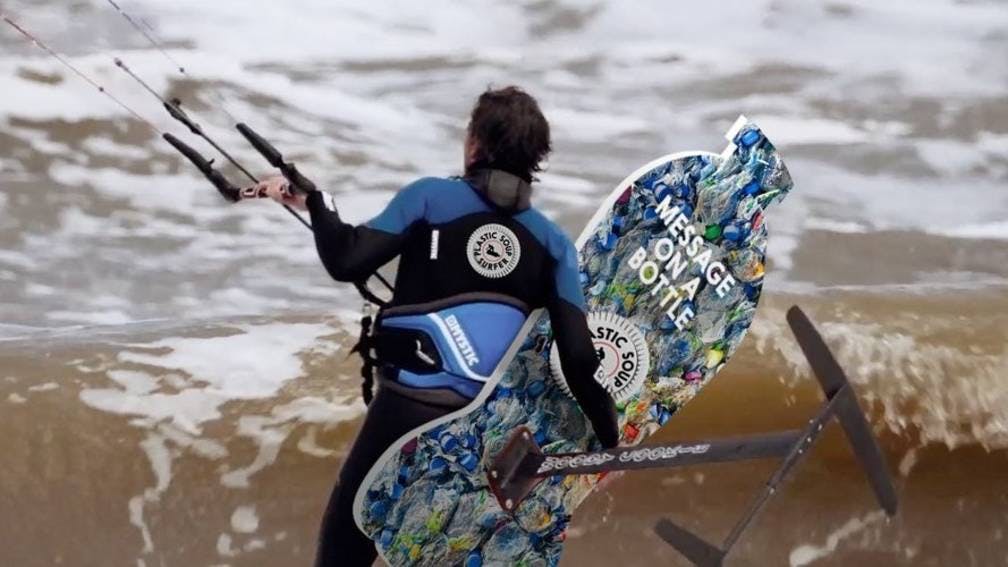

Surfer breaks political deadlock
1 resolution, 2 expeditions, 10 bailiffs, 55k signatures; one goal...
How a record attempt on a board made from plastic bottles led to a resolution in parliament that meant the breakthrough of a 20 year deadlock on deposits for small beverage containers in the Netherlands. This measure will prevent many tens of milions of plastic bottles from being littered each year.
Historical decision on deposits
April 25th 2020 state-secretary Van Veldhoven officially declared that deposits on small plastic bottles will be mandatory from July 1ste 2021 onward. A breakthrough decision after more than twenty-year fight and lobbying by industry.
This decision is a direct result of the 'Plastic Soup Surfer petition resolution': the political promise in 2017 to "reduce litter caused by plastic bottles by 90% within 3 years with effective measures"
In the Netherlands over 70 million small plastic bottles are littered in streets, parks and waterways on a yearly basis. Deposits help prevent this.
The adoption of the 'plastic soup surfer resolution' was the breakthrough of a political deadlock. A two decade long fight between industry and environmental NGO's had forced political parties into a trench war with unsurmountable principal differences preventing a compromise. Since industry was on the upper hand it managed to delay decision making and jump from parliament to new parliament, keeping the deadlock in place.
The new approach by the Plastic Soup Surfer surprised the fighting parties. The 'Plastic Soup Surfer resolution' (adopted Feb 16th 2017) brought a pragmatic approach:
First; it split the battle over beverage containers and narrowed it down to plastic bottles as a first start.
Secondly; it put the result - no plastic pollution - in the center of the discussion instead of the reverse-vending machines, the logistics and the costs (the means)..
State secretary Dijksma (PvdA) and Van Veldhoven (D66) successively understood the new angle and have used the 'Plastic Soup Surfer petition resolution' as the basis for new policy.
(The 'Plastic Soup Surfer resolution' was written by the surfer himself and was adopted by parliament without vote: unique in Dutch parliamentary history.)
To attract attention to his petition 'pro deposits' Merijn Tinga kitesurfed across the North Sea to England (190km) on a surfboard composed of small plastic bottles: a crossing never attempted before in this direction.
3x why deposits are important
1. Plastic Soup
It prevents littering and pollution of the environment.
2. Recycling
High quality recycling guaranteed. A plastic bottle will actually return as a plastic bottle - No downcycling.
3. Throw away culture
This measure changes behavior and sees to revalue materials and products. An important step toward sustainability within a society designed around 'single use' and 'throw away'.
Two boards, two campaigns, one goal
The gamplay with Coca Cola and supermarkets
To pull industry and their lobby against deposits into the lime light the 'Source to Sea' campaign was launched. The Plastic Soup Surfer paddled +1000km down the entire river Rhine on a standup paddle board made from plastic bottles: from the source high up in the Alps back to the North Sea.
During his expedition he looked for litter floating down the river with him. Packaging he planned to bring back to the companies that put them on the market. In doing so returning this plastic from sea back to the source.
A judicial instrument called the 'formal notice' made it possible to use bailiffs (gerechtsdeurwaarders) to directly target companies and company CEO's. The Plastic Soup Surfer assigned the bailiffs to visit 10 boardrooms from Coca-Cola to Heineken and supermarkets like Aldi, LIDL and Ahold (Albert Heijn). These executives were made 'formally aware' of the 'harm and effects' of their plastic packaging in the environment: implicitly making them responsible.
These meetings and talks resulted in deepening the divide between supermarkets and soda companies but also between supermarket-chains. Sodacompanies feeling the time had come for deposits. Supermarket chains still opposing but bringing diffences in interests between them to the light. Several national TV and radio programs made reports about this previously 'behind the scenes battle'.
The judicial notice
There is a direct relation between the plastic products of these companies and the effects it has on the environment, sea life and eventually us human beings. Once a CEO is made aware of this through the 'judicial notice' (NL: desbewustheidsexploot), it implies he has to take corporate responsibility and minimize the effects for example through product design, logistics and communication.
We make CEOs and top managers ‘Formally Aware’ of the plastic pollution problem by sending them a ‘judicial awareness notice’. A notice borrowed from Patent Law but in our case uniquely applied for the plastic pollution problem; a world first. The Formal Notice makes it possible to address a particular CEO and company and a bailiff has to deliver it in person.
Deployed carefully we managed to start a dialog on plastic pollution with several of these decision makers.
We got to talk to CEOs and top managers of 10 supermarkets and soda companies: Coca Cola, Pepsi, Spa, Heineken, Albert Heijn, Aldi, Lidl, Jumbo, Superunie, Vrumona.
Samenwering activisten
This decision on deposits is the result of a great collaboration between many different NGO's and various grass roots initiatives that all used their own angles and strongpoints. People like the Zwerfinator, GoClean de Liemers and a large group of litterpickers have proven crucial to keep the pressure high.
Our next goal in pushing back 'Throw-away culture' is deposits on cans. Expected in the fall of 2022
Zwerfinator x Soup Surfer Collab
From now on companies we've visited can never say they did not know...

